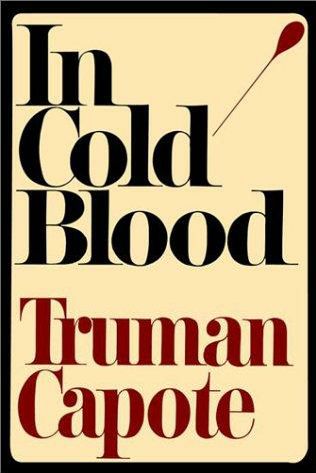The Truth, Lies and Everything in Between
 I saw "Capote" last night, and thought it was well done -- Phillip Seymour Hoffman is especially excellent. But poor Nell Harper Lee, shoved to the side despite the success of her "little novel about killing birds."
I saw "Capote" last night, and thought it was well done -- Phillip Seymour Hoffman is especially excellent. But poor Nell Harper Lee, shoved to the side despite the success of her "little novel about killing birds."Back in high school, I read In Cold Blood straight from my Dad's stash of "New Yorkers," as it was originally published over the course of four issues. In both the magazine version, and in Capote's book, a preface forewarns the reader that all the quotations are taken "verbatim" from "official records" or interviews with those involved. The subtitle on my paperback edition of the novel reads: "A True Account of a Multiple Murder and its Consequences". Elsewhere it is referred to as nonfiction, and it's a book generally regarded as the first work -- or most well-known first work -- of New Journalism, the -ism that splashed a little narrative intrigue onto the pages of magazines and newspapers worldwide.
I'll admit that I haven't read James Frey's A Million Little Pieces, but I've nominally followed the fracas to emerge after The Word of Oprah deemed it a big, fat lie. Clearly, according to Oprah, Frey's mistake was calling the book an autobiography, and expecting that it would sit amid other works of nonfiction at your local bookstore, when he'd taken some liberties with his life story. At my local bookstore, Cody's, there's a table for "Nonfiction" and one for "Fiction," but I think Frey's book is just another in a long line of works, Capote's included, that demand a new table. Let's call it the "Ehh... A Little of Both" table.
Because let's get down to brass tacks, here. Sure, you could argue that there's such a thing as "pure" fiction and "pure" nonfiction, but a good portion of literature skirts the boundaries between these two categories.
 We might assume that a history book is telling us the truth (unless it's something Rush Limbaugh wrote) and therefore should sit with the other nonfiction goody twoshoes. But all writing is in essence a process of revision: that is, in the act of writing a history of the Napoleonic Wars, the historian makes the decision to include some things and omit others. Also, he might throw in a conversation or two that he didn't actually hear, or describe the buttons on someone's jacket even though he doesn't know anything about buttons, much less the buttons Napoleon wore. And that doesn't make the book any less of a history, it just admits that there is a narrative process at work in nonfiction, one that shoves our book about the Napoleonic Wars (a subject about which I know nothing, by the way) over to the edge of the prissy little nonfiction table, where Capote and Frey are teetering.
We might assume that a history book is telling us the truth (unless it's something Rush Limbaugh wrote) and therefore should sit with the other nonfiction goody twoshoes. But all writing is in essence a process of revision: that is, in the act of writing a history of the Napoleonic Wars, the historian makes the decision to include some things and omit others. Also, he might throw in a conversation or two that he didn't actually hear, or describe the buttons on someone's jacket even though he doesn't know anything about buttons, much less the buttons Napoleon wore. And that doesn't make the book any less of a history, it just admits that there is a narrative process at work in nonfiction, one that shoves our book about the Napoleonic Wars (a subject about which I know nothing, by the way) over to the edge of the prissy little nonfiction table, where Capote and Frey are teetering.Fiction is the same way, and perhaps its crossover into nonfiction is a little easier to swallow, since historical fiction is fairly popular among grandparents and nerds these days (and uber-cool bloggers). Plus, no one has a hissy fit if a novelist includes something that's historical, whereas if a so-called nonfiction writer tosses in a couple of imaginary years in jail, well, the shit hits the fan. At least on Oprah.
These are a few of the issues I'm sorting out in my dissertation, if you hadn't guessed. I find it fascinating to think about that undefined space that In Cold Blood occupies: the space between imagination and reality. In an article I read today, a critic writing about testimonial novels (which are fairly similar, in some ways, to autobiographies like Frey's), says she believes that "readers are not aware of the fictitious aspects of testimonial novels," that the imaginary aspects of a "nonfiction" book are "perceived by literary critics but not by ordinary readers."
Now hold on just a gosh darn minute there! I'm not so sure we're* as dumb as we look. Are we?
*For the purposes of this "we," let's just pretend I'm not a literary critic-in-training, ok?
Labels: I pontificate therefore I am


2 Comments:
Wow...right on! That's where I read Capote too...but at the time I never thought he could be embellishing the story...now I'll read non-fiction with some caution.
With more caution, or just with a healthy dose of skepticism -- but maybe that's the cynicism I had for breakfast talking...
Post a Comment
<< Home